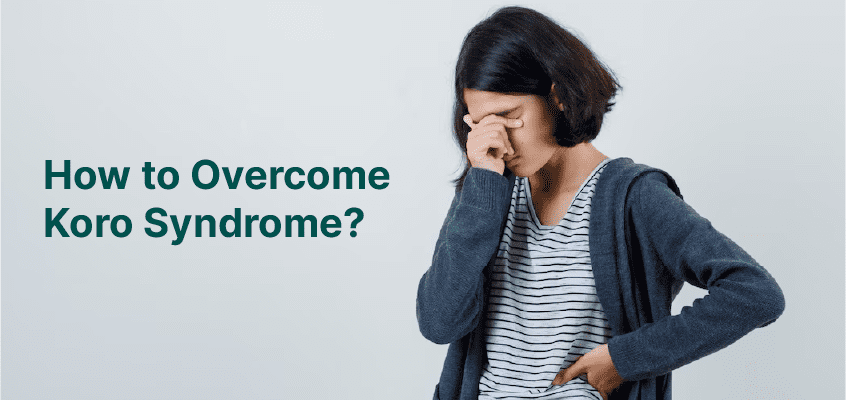Introduction
Koro syndrome is when people believe their genitalia (penis or vulva) are drawn back into their bodies. The word ‘koro’ comes from the Malay word ‘kura-kura’, which refers to a turtle pulling its head inside its shell. If you are facing this syndrome, visit a medical professional for a thorough check-up, as it is linked with mental illnesses like anxiety. Read on to learn more about this syndrome and its treatment.
What is Koro Syndrome?
Koro syndrome is also known as genital retraction syndrome or genital retraction disorder. However, the word Koro refers to the anxiety caused by the thought of one’s genitalia contracting and disappearing within one’s body and often manifests as an epidemic, with numerous cases recorded within a short time in the same region. Recent studies [1] show a correlation between Koro syndrome and various mental health and addiction issues, including mood disorders, schizophrenia [5], and substance abuse. In primary Koro [2], an episode of Koro is started by a concerning thought about one’s size of genitalia. For example, someone’s penis may somewhat retract due to an insect bite, fatigue, or lower temperatures. On the other hand, the diagnostic approach for secondary Koro is complex, as other psychiatric illnesses often accompany it.
Causes of Koro Syndrome
Acute anxiety and fear about the retraction of one’s genital leading to death describe the koro syndrome. The main causes of this psychiatric disorder fall into four categories.
Cultural Factors
-
Restrictive social norms about one’s body and sexuality
-
Cultural norms and expectations about penis size
-
Belief in spirit possession
Psychological factors
- Guilt over masturbation and impotence
- Sexual promiscuity
- Premorbid sex inadequacy
Biological factors
- Psychosocial conflicts
- Individual personality factors
How to overcome Koro Syndrome
Now, western psychiatrists usually treat Koror syndrome as a phobia. However, the standard treatment for secondary Koro syndrome addresses the underlying psychological issues that cause anxiety. Management for anxiety disorders [6] includes medication and therapy. In addition, talk therapy with a psychologist about your struggles with sexual expectations may help you develop a positive attitude about your body. It, in turn, can aid with overcoming the symptoms of Koro syndrome. Therapists also analyse the probable cultural causes of Koro while devising a treatment plan.
When to seek help
You should seek professional help if you experience the following symptoms [4]:
-
Acute perception of retraction of the penis
-
A tingling feeling in and around the genitals
-
Fear of impending danger, including death
-
Trying mechanical means of traction of the penis to prevent retraction
-
History of preoccupation or obsession with your genitals
-
Experiencing anxiety, fear, or guilt around the size of your genitals
-
Acute-panic-like reaction on seeing or touching your genitals
-
Measuring your penis frequently and tugging or pulling it to increase its size
While physical sensations like pain and tingling are frequent in people suffering from the
Koro syndrome might also be a sign of a different medical concern. If you experience these symptoms, you should see a urologist for a comprehensive check-up.
Summing up
Moreover, a detailed psychosomatic presentation of Koro, whether in its cultural setting or as a secondary pathology generated from a mental or physical illness, is best to see a medical professional. Although this way, you would be in a well-informed position to understand the reasons behind your fear and anxiety and seek proper treatment. Meanwhile, contact United we care if you need professional assistance dealing with Koro syndrome.
References
- Chowdhury, A. N., & Brahma, A. (2020). Update on Koro research methodology. Indian Journal of Psychiatry, 62(1), 102.
- Ang, P. C., & Weller, M. P. I. (1984). Koro and psychosis. The British Journal of Psychiatry, 145(3), 335-335.
- Niraj Ahuja, K. P. (2002). A short textbook of psychiatry. New Delhi: Jaypee Brothers Publication, 12-14.
- Stip, E., Nguyen, J., Bertulies-Esposito, B., Tempier, A., Bedard, M. J., Paradis, A., & Javaid, S. F. (2021). Classical Koro and Koro-Like Symptoms: Illustration from Canada. Journal of Psychosexual Health, 3(3), 222-235.
- El-Badri, S., & Leathart, A. (2017). Koro-like symptoms associated with schizophrenia. Open Journal of Psychiatry, 7(3), 213-219.
- Dan, A., Mondal, T., Chakraborty, K., Chaudhuri, A., & Biswas, A. (2017). Clinical course and treatment outcome of Koro: A follow-up study from a Koro epidemic reported from West Bengal, India. Asian Journal of Psychiatry, 26, 14-20.









